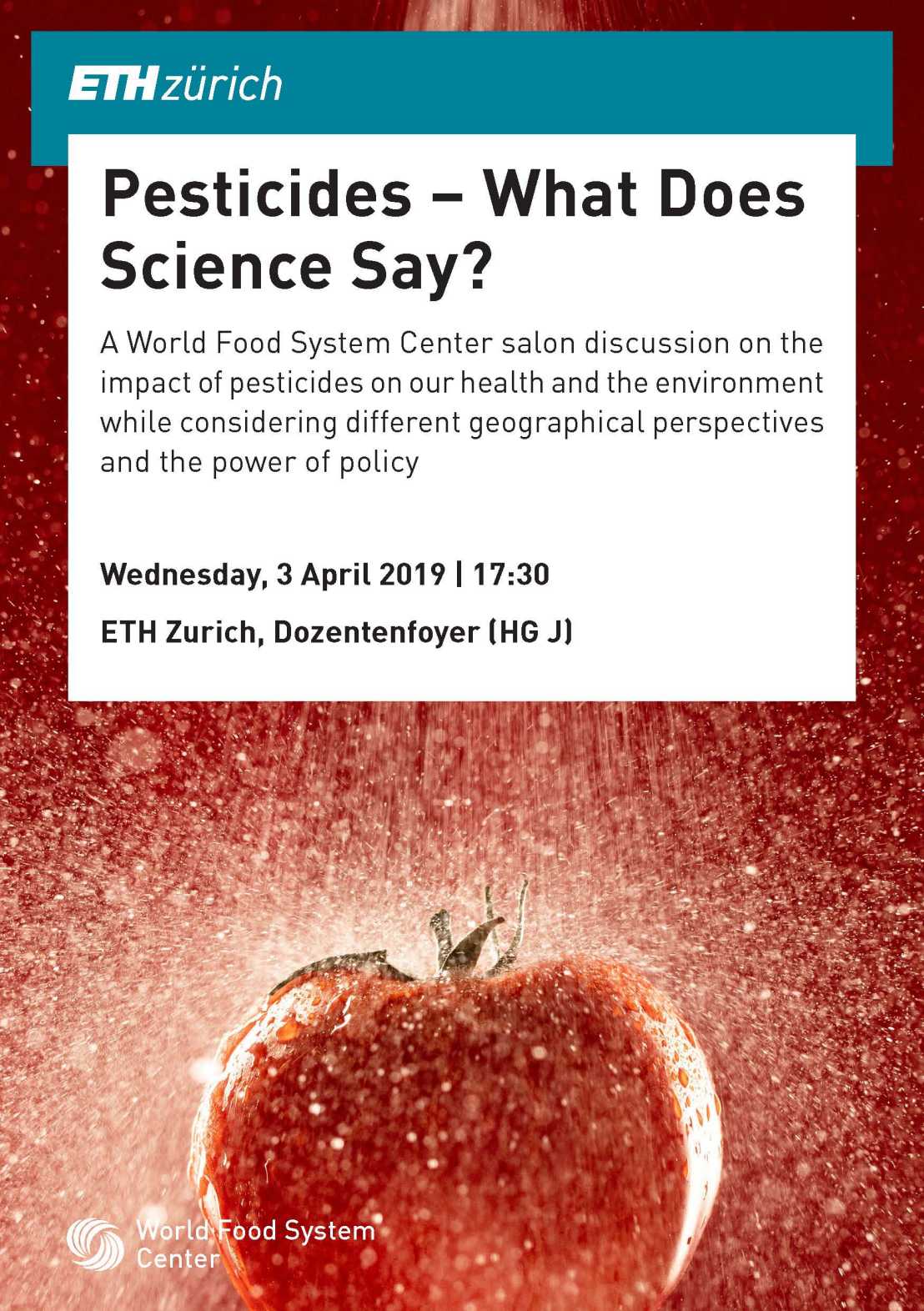Pesticides – What does Science Say?
At our public discussion event on 03 April, the audience heard answers to their pressing questions about use of pesticides in food systems. The panelists Prof. Robert Finger, Dr. Lothar Aicher, and Philipp Staudacher provided their viewpoints and the audience could further discuss with several invited scientists.

Do you wash your apple before you eat it? The use of pesticides in agriculture and the consequences on the environment and human health are a subject of timely discussions. The World Food System Center wants to contribute knowledge to the debate about the use of pesticides in food systems. In order to provide a platform for a science-based discussion and address questions relevant for a broad audience, we held a salon discussion at ETH Zurich on 03 April. The over 100 guests could send questions to a panel of experts and talk further with them and other invited scientists in open discussion.
Michelle Grant moderated the evening, which started with the introduction of the panel for the evening: Robert Finger, professor of Agricultural Economics and Policy at ETH Zurich, Dr. Lother Aicher, a regulatory toxicologist at the Swiss Center for Applied Human Toxicology, and Philipp Staudacher, a doctoral student at Eawag. The discussion focused on four questions, that were chosen from those sent during registration:
- What evidence do we have about the main impacts of (synthetic) pesticides on the environment?
- What evidence do we have about the main impacts of (synthetic) pesticides on human health?
- Under most organic labels, the use of synthetic pesticides is banned. Instead “natural” pesticides – for example copper sulfate as a fungicide – are used. What can you tell us about the environmental and health impacts of these substances in comparison to the synthetic ones?
- Switzerland currently has two separate peoples initiatives open related to pesticides: the “Clean Drinking Water and Healthy Food” Initiative and the “For a Switzerland without synthetic pesticides” initiative. What are your perspectives on such policy measures? What would be alternative policy approaches?
Comments from panelists were broad in range, from specific pesticide affects and how risk assessments are conducted to more system-based issues of how agricultural policy changes over time.
Interesting comments from a toxicology point of view were, first, the clear definition that all pesticides are made to be toxic, be them natural or synthetic. As analytical methods and quantification limits have improved, we can detect these chemicals at low concentrations in a range of matrixes. Problems arise when these detected levels exceed a toxicity threshold, be it for water biota or humans. But, high exposure does not necessarily mean high risk. Dr. Aicher also spoke of the risk assessment process for pesticides and that we need to remember emotion has a large part in our own decisions about food.
From a policy perspective, set thresholds are not questionable from a regulatory standpoint. Farmers can be directly affected if levels are exceeded. Also, the goals of agricultural policy are changing. Growing enough food for the Swiss population has been an agricultural goal, but as perspectives and preferences change, so does policy. Prof. Finger commented that the population is asking different things from agriculture, which we see in the people’s intiatives. The series of initiatives show a gap in societal demand to what the agriculture delivers. These intiatives may not pass, but they can still change agricultural policy.
Also in policy, one must realize there are lots of trade-offs and all must be quantified so as to be judged at once. A combination of solutions is often more sustainable.
After this plenary session, all attending were encouraged to continue the discussion with the three panelists as well as with other invited researchers working on issues related to pesticide use in food systems. With a drink and a snack, the audience engaged in a lively discussion and learned more about different perspectives and trade-offs associated with the topic:
- International perspective impact on environment and health with Philipp Staudacher (Eawag)
- Swiss perspective- environmental impacts with Rik Eggen (Eawag) and Juliane Hollender (Eawag)
- Swiss perspective- policy with Robert Finger (ETH Zürich)
- Economics of pesticides with Alain Carpentier (INRA, Rennes) and Niklas Möhring (ETH Zurich)
- Toxicology with Lothar Aicher and Chantal Britt (Swiss Center for Applied Human Toxicology)
We thank the all the invited scientists for coming to share their views with the audience and to all for contributing to the open discussion.
 Panelist Philipp Staudacher discussing further with guests during the reception.
(Image: WFSC)
Panelist Philipp Staudacher discussing further with guests during the reception.
(Image: WFSC)
 Discussions continue at the toxicology table during the reception.
(Image: WFSC)
Discussions continue at the toxicology table during the reception.
(Image: WFSC)
 Robert Finger engaging with guests on the topic of policy.
(Image: WFSC)
Robert Finger engaging with guests on the topic of policy.
(Image: WFSC) Important fuel for discussions at the economics table. (Image: WFSC)
Important fuel for discussions at the economics table. (Image: WFSC)



